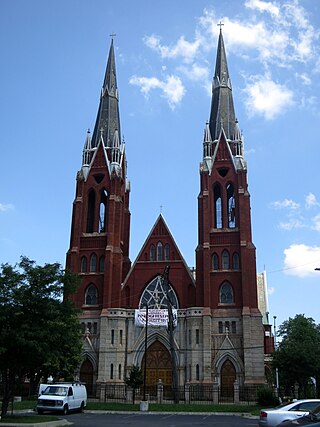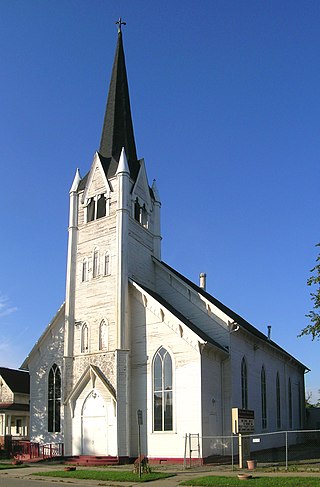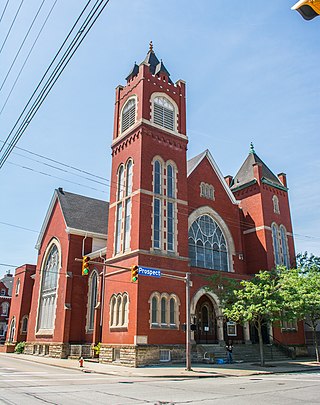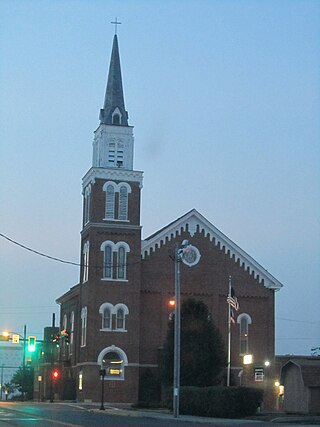The Lutheran Church in America (LCA) was an American and Canadian Lutheran church body that existed from 1962 to 1987. It was headquartered in New York City and its publishing house was Fortress Press.
The Ceylon Evangelical Lutheran Church (CELC), formerly known as Lanka Lutheran Church, is a Lutheran body in Sri Lanka. It is a denomination of around 5000 members and has been in fellowship with the Lutheran Church–Missouri Synod (LCMS) since 2001. It is a full member of the International Lutheran Council.

The Lutheran Churches of the Reformation (LCR) is an association of Lutheran congregations. The LCR has its roots among groups of Lutherans that broke with the Lutheran Church–Missouri Synod (LCMS) in the middle of the 20th century, and was formally incorporated in 1964. Church services are generally traditional and reverent in the style of the mid-1900s conservative Christians.

The Evangelical and Reformed Church (E&R) was a Protestant Christian denomination in the United States. It was formed in 1934 by the merger of the Reformed Church in the United States (RCUS) with the Evangelical Synod of North America (ESNA). A minority within the RCUS remained out of the merger in order to continue the name Reformed Church in the United States. In 1957, the Evangelical and Reformed Church merged with the majority of the Congregational Christian Churches (CC) to form the United Church of Christ (UCC).

Mariners' Church of Detroit is a church with worship services adhering to Anglican liturgical traditions located at 170 East Jefferson Avenue in Downtown Detroit, Michigan. It was founded in 1842 as a special mission to the maritime travelers of the Great Lakes and functioned as a parish of the Episcopal Diocese of Michigan until 1992, when the Michigan Court of Appeals ruled it was incorporated as an independent congregation. The church was listed on the National Register of Historic Places in 1971. The church has a non-exclusive, limited association with the REC Diocese of Mid-America which itself is a founding member of the Anglican Church in North America.

Trinity Evangelical Lutheran Church is a Victorian Gothic-style Lutheran church built in Milwaukee, Wisconsin in 1878 - then claimed to be "the finest church edifice within the Missouri Synod." Today it is listed on the National Register of Historic Places and is a designated State Historic Site. The building was also declared a Milwaukee Landmark in 1967, and today is the oldest church associated with the Lutheran Church–Missouri Synod in the city.

Christ Evangelical Lutheran Church is a historic church built in 1901 by a German Lutheran congregation southwest of the Walker's Point neighborhood of Milwaukee, Wisconsin. It is listed on the National Register of Historic Places.

The Evangelical Lutheran Church in Lithuania is a Lutheran church body comprising congregations in Lithuania. The ELCL is a member of the Porvoo Communion and the Lutheran World Federation.

Lutheranism is present on all inhabited continents with an estimated 80 million adherents, out of which 74.2 million are affiliated with the Lutheran World Federation. A major movement that first began the Reformation, it constitutes one of the largest Protestant branches claiming around 80 million out of 920 million Protestants. The Lutheran World Federation brings together the vast majority of Lutherans. Apart from it, there are also other organisations such as the International Lutheran Council and the Confessional Evangelical Lutheran Conference, as well as multiple independent Lutheran denominations.

St. John's Evangelical Lutheran Church is a Gothic Revival-styled church built in 1889 in Milwaukee, Wisconsin by a congregation with German roots. In 1992, the church and associated buildings were listed on the National Register of Historic Places. It is also designated a Milwaukee Landmark.

The Sweetest Heart of Mary Roman Catholic Church is located at 4440 Russell Street in Detroit, Michigan, in the Forest Park neighborhood on the city's central East side. The Gothic Revival cathedral styled church is the largest of the Roman Catholic churches in the City of Detroit. It was designated a Michigan State Historic Site in 1974 and listed on the National Register of Historic Places in 1978. It, along with St. Albertus Roman Catholic Church, 0.4 miles east on East Canfield Street, and St. Josaphat Roman Catholic Church, 0.3 miles west at East Canfield Street and Chrysler Drive, served the large Polish community through most of the twentieth century. In a diocesan reorganization instituted by Archbishop Allen Vigneron in 2013, Sweetest Heart of Mary joined with St. Josephat to form Mother of Divine Mercy Parish.

Trinity Episcopal Church is located at 1519 Martin Luther King Boulevard in the Woodbridge Historic District of Detroit, Michigan. The church was designated a Michigan State Historic Site in 1979 and listed on the National Register of Historic Places in 1980. It is now known as Spirit of Hope.

The Gethsemane Evangelical Lutheran Church is a church located at 4461 Twenty-Eighth Street in Detroit, Michigan. It was designated a Michigan State Historic Site in 1980 and listed on the National Register of Historic Places in 1982. The building now houses the Motor City Missionary Baptist Church.

The Assumption of the Blessed Virgin Mary Church is a Catholic church of the Archdiocese of Detroit located at 13770 Gratiot Avenue in Detroit, Michigan. It is commonly known as the Assumption Grotto Church. The church community was founded in the 1830s, and the present building completed in 1929, designated a Michigan State Historic Site in 1990 and listed on the National Register of Historic Places in 1991.
The Lutheran Church in Ireland is a Lutheran church, operating across the island of Ireland.

Zion Lutheran Church is a historic Lutheran church located along Prospect Avenue near downtown Cleveland, Ohio, United States. Formed in the 1840s, the congregation built the present building shortly after 1900, along with an adjacent church school. Both buildings have been named historic sites. The school is no longer open.

St. Paul Lutheran Church is located in central, Davenport, Iowa, United States. It is affiliated with the Evangelical Lutheran Church in America (ELCA). The church's original property, which subsequently housed other Protestant congregations, was listed on the National Register of Historic Places in 1983, but has since been torn down. The present complex was built in 1952 and contains two buildings that are contributing properties in the Vander Veer Park Historic District. The present church building was completed in 2007.

First Lutheran Church is a Lutheran church in Springfield, Ohio, and is in the Southern Ohio Synod of the Evangelical Lutheran Church in America (ELCA).

The Evangelical Lutheran Church in Russia, Ukraine, Kazakhstan and Central Asia, also known as the Evangelical Lutheran Church in Russia and the Other States (ELCROS), is a Lutheran denomination that itself comprises seven regional Lutheran denominations in Belarus, Georgia, Kazakhstan, Kyrgyzstan, Russia, Ukraine, and Uzbekistan as well as individual congregations in Azerbaijan, Tajikistan, and Turkmenistan. Established in its current form in 1999, ELCROS currently has about 24,050 members in more than 400 congregations within its jurisdiction.

Trinity Lutheran Church is a member congregation of the Lutheran Church–Missouri Synod (LCMS) in Altenburg, Missouri.






















